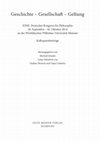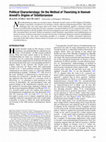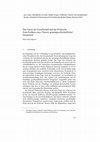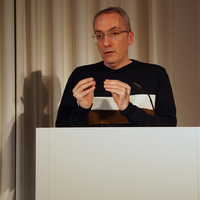Papers by Hans-Jörg Sigwart
Eric Voegelin Yearbook, Vol. 1, 2022
in: Böschen, Stefan et al. (Eds.): Technikfolgenabschätzung. Handbuch für Wissenschaft und Praxis, 2021
Hannah Arendt: Vita Activa oder Vom tätigen Leben. Erweiterte Neuausgabe. Hrsg. von Thomas Meyer, München (Piper), 2020
This handbook Article revisits the relation between hermeneutics and critical theory. Against the... more This handbook Article revisits the relation between hermeneutics and critical theory. Against the background of the controversy on this problem between Hans Georg Gadamer and Jürgen Habermas, the Article reflects on recent perspectives in political theory.
Spiegel online, 2020
Politik in Zeiten von Corona darf sich nicht in Krisenbewältigung erschöpfen. Sie muss auch Zukun... more Politik in Zeiten von Corona darf sich nicht in Krisenbewältigung erschöpfen. Sie muss auch Zukunft gestalten. Die aktuelle Krise erfordert eine demokratische und eine zur Utopie fähige Politik.
In: Lammert C., Siewert M., Vormann B. (eds.): Handbuch Politik USA. Springer Reference Sozialwissenschaften. Springer VS, Wiesbaden 2019 (im Erscheinen); online first: https://link.springer.com/referenceworkentry/10.1007%2F978-3-658-04125-0_6-2, 2019
Überarbeitete Neuauflage von Sigwart (2015): Strömungen der US-amerikanischen politischen Theorie.
This Handbook Article examines the significance of hermeneutics in the history of political ideas... more This Handbook Article examines the significance of hermeneutics in the history of political ideas, sketching the general hermeneutic problem, its methodological implications, and major controversies on how to connect hermeneutics and politcs in the study of the history of ideas.
in: Cornelia Navari (Ed.) (2017): Hans J. Morgenthau and the Amerian Experience, London (Palgrave... more in: Cornelia Navari (Ed.) (2017): Hans J. Morgenthau and the Amerian Experience, London (Palgrave Macmillan), pp. 27-54.

In dem Aufsatz wird die aktuelle Relevanz politischer Ideengeschichte und die Frage diskutiert, w... more In dem Aufsatz wird die aktuelle Relevanz politischer Ideengeschichte und die Frage diskutiert, welchen Beitrag sie zur kritischen Gegenwartsdiagnose leisten kann. Ausgangspunkt ist die These, dass die Rekonstruktion der historischen Genese gegenwärtiger gesellschaftlicher Selbstverständnisse unmittelbar gesellschaftskritische Implikationen hat, weil sie als Grundlage dafür dienen kann, bestimmte ideelle Festlegungen und praktische Deutungsroutinen einer kritischen Analyse zu unterziehen. Politische Ideengeschichte kann zu einer solchen Analyse unter anderem die Perspektive einer kritischen Wirkungsgeschichte beitragen, aus der sich die besonderen Effekte und Dynamiken in den Blick nehmen lassen, die sich aus der praktischen Applikation von „Ideen“ für die Logik der Praxis gegenwärtiger gesellschaftlicher Selbstinterpretation ergeben. Zu diesen Effekten gehören insbesondere Tendenzen der Enthistorisierung, der De- und Rekontextualisierung sowie der Tautologisierung von „Ideen“, in deren Verlauf diese die Form historischer „Gespenster“ annehmen, für deren praktische Wirkung in der Gegenwart gerade die Verschleierung ihrer historischen Genese eine konstitutive Voraussetzung ist.

American Political Science Review 2016
Notwithstanding its status as a modern classic, Hannah Arendt's study on The Origins of Totalitar... more Notwithstanding its status as a modern classic, Hannah Arendt's study on The Origins of Totalitarianism is generally considered to be lacking a clearly reflected methodological basis. This article challenges this view and argues that in her study Arendt implicitly applies a characterological method of political theorizing that provides a genuine conceptual framework for systematically connecting structural analysis with ideographic historical investigations and with a political theory of action. On this conceptual basis, the study renders an analysis of anti-Semitism, imperialism, and totalitarianism not merely in terms of abstract structural concepts, but in terms of dynamic character-context constellations. Arendt's account not only shows interesting parallels to a number of similar conceptual reflections, especially in the 20th century's theory debate; it can also serve to inspire the current debate on methodology in political theory.

Der Artikel nimmt aus gesellschafts-und politiktheoretischer Perspektive das Problem der theoreti... more Der Artikel nimmt aus gesellschafts-und politiktheoretischer Perspektive das Problem der theoretisch-begrifflichen Bestimmung des »Ganzen« der Gesellschaft und also des gesamtgesellschaftlichen Integrationsproblems in den Blick. Der Topos des »Ganzen« der Gesellschaft gehört nicht nur sowohl in der Politischen als auch in der Gesellschaftstheorie zu den klassischen konzeptionellen Grundproblemen, dessen Lösung zudem in beiden Diskursen notorisch umstritten ist. Er bezeichnet außerdem eine sachliche Problematik, an der sich besonders prägnant herausarbeiten lässt, inwiefern beide theoretischen Perspektiven in ihren jeweiligen Grundlagen aufeinander verweisen. Im ersten Teil des Artikels werden zunächst konzeptionelle Schwierigkeiten gesellschafts- und politiktheoretischer Verständnisse von Gesellschaft als Ganzer untersucht und auf ihre theoretischen Implikationen hin befragt. Diese Implikationen aufgreifend, schlägt der zweite Teil eine Konzeption der politischen Integration von Gesellschaft vor, die deren "Ganzes" als segmentär differenzierten, personal kodierten und am kommunikativen "Leitwert" kollektiver Selbstbestimmung orientierten Integrationszusammenhang bestimmt.

Polity, Jul 2014
This article analyzes Rousseau's political theory of private property, fills a lacuna in the lite... more This article analyzes Rousseau's political theory of private property, fills a lacuna in the literature, and develops a novel interpretation of Rousseau's apparently contradictory remarks. Although Rousseau was critical of private property, he did not advocate a clear and easy solution to the problems he discerned. Instead, he put forth a highly differentiated perspective that was principled and pragmatic. He rooted the legitimacy of private ownership in an ideal theory of republican property rights, which refers primarily to the normative principle of reciprocity. In his opinion, a balance of private property rights is indispensable to a well-ordered society and a just republic not only because it binds the state, society, and citizen together, and not only because it secures the independence of individual citizens from each other, but also because it enhances political legitimacy and reciprocity. On these principled grounds, Rousseau's theory rules out "collectivist" solutions as much as vast differences in wealth and "absolutist" theories of more or less unlimited private property rights. Instead, his theory builds on the republican idea of private property as a public political institution. Within this ideal framework, Rousseau allows for certain non-ideal deviations in particular circumstances on prudential grounds.
in: Lammert, Christian/Siewert, Markus/Vormann, Boris (Hrsg.): Handbuch Politik USA, Wiesbaden (Springer) 2015
Der Aufsatz gibt einen Überblick über wichtige Strömungen und Themen in der politischen Theorie d... more Der Aufsatz gibt einen Überblick über wichtige Strömungen und Themen in der politischen Theorie der USA und skizziert ihre Stellung in der US-amerikanischen Politikwissenschaft und Gesellschaft. Die politische Theorie ist eng mit dem demokratischen Selbstverständnis der USA verbunden. Zugleich bewegt sie sich in einem internationalen Kommunikations- und Wirkungshorizont. Thematisch steht die Begründung und kritische Reflexion einer demokratischen Idee des politischen Liberalismus im Zentrum der US-amerikanischen politischen Theorie. Zu den wichtigsten Entwicklungstendenzen der aktuellen Debatte gehört der Versuch einer Globalisierung der politisch-theoretischen Perspektive.
in: Wie wollen wir leben? Das politische Denken und Staatsverständnis von Charles Taylor. Ed. by Ulf Bohmann, Baden-Baden (Nomos) 2014, pp. 140-175

in: Polity 46/3 (2014), pp. 381.406., 2014
This article analyzes Rousseau’s political theory of private property, fills a lacuna in the lite... more This article analyzes Rousseau’s political theory of private property, fills a lacuna in the literature, and develops a novel interpretation of Rousseau’s apparently contradictory
remarks. Although Rousseau was critical of private property, he did not advocate a clear and easy solution to the problems he discerned. Instead, he put forth a highly differentiated
perspective that was principled and pragmatic. He rooted the legitimacy of private ownership in an ideal theory of republican property rights, which refers primarily to the normative principle of reciprocity. In his opinion, a balance of private property rights
is indispensable to a well-ordered society and a just republic not only because it binds the state, society, and citizen together, and not only because it secures the independence of individual citizens from each other, but also because it enhances political legitimacy and reciprocity. On these principled grounds, Rousseau’s theory rules out “collectivist” solutions as much as vast differences in wealth and “absolutist” theories of more or less
unlimited private property rights. Instead, his theory builds on the republican idea of private property as a public political institution. Within this ideal framework, Rousseau allows for certain non-ideal deviations in particular circumstances on prudential grounds.











Uploads
Papers by Hans-Jörg Sigwart
remarks. Although Rousseau was critical of private property, he did not advocate a clear and easy solution to the problems he discerned. Instead, he put forth a highly differentiated
perspective that was principled and pragmatic. He rooted the legitimacy of private ownership in an ideal theory of republican property rights, which refers primarily to the normative principle of reciprocity. In his opinion, a balance of private property rights
is indispensable to a well-ordered society and a just republic not only because it binds the state, society, and citizen together, and not only because it secures the independence of individual citizens from each other, but also because it enhances political legitimacy and reciprocity. On these principled grounds, Rousseau’s theory rules out “collectivist” solutions as much as vast differences in wealth and “absolutist” theories of more or less
unlimited private property rights. Instead, his theory builds on the republican idea of private property as a public political institution. Within this ideal framework, Rousseau allows for certain non-ideal deviations in particular circumstances on prudential grounds.
remarks. Although Rousseau was critical of private property, he did not advocate a clear and easy solution to the problems he discerned. Instead, he put forth a highly differentiated
perspective that was principled and pragmatic. He rooted the legitimacy of private ownership in an ideal theory of republican property rights, which refers primarily to the normative principle of reciprocity. In his opinion, a balance of private property rights
is indispensable to a well-ordered society and a just republic not only because it binds the state, society, and citizen together, and not only because it secures the independence of individual citizens from each other, but also because it enhances political legitimacy and reciprocity. On these principled grounds, Rousseau’s theory rules out “collectivist” solutions as much as vast differences in wealth and “absolutist” theories of more or less
unlimited private property rights. Instead, his theory builds on the republican idea of private property as a public political institution. Within this ideal framework, Rousseau allows for certain non-ideal deviations in particular circumstances on prudential grounds.